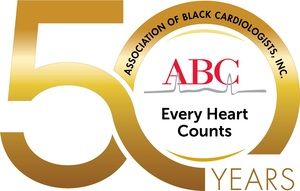The Association of Black Cardiologists collaborating with Quantum Genomics' NEW-HOPE Study, incorporating minority inclusivity, presents Late-Breaking Trial success of novel antihypertensive agent
Firibastat meets primary endpoint and demonstrates highly significant and clinically relevant efficacy in lowering blood pressure in a diverse population whose hypertension is typically difficult to treatThese results pave the way to a pivotal Phase 3 trial with firibastat in resistant hypertension
CHICAGO, Nov. 10, 2018 /PRNewswire/ -- The Association of Black Cardiologists (ABC), an inclusive organization dedicated to eliminating disparities in cardiovascular diseases, and Quantum Genomics, a biopharmaceutical company that developed a new drug class that directly targets the brain to treat hypertension and heart failure, today announced excellent short-term results from its Phase 2b NEW- HOPE trial of firibastat, a first-in-class brain aminopeptidase A inhibitor (BAPAI). The results of the trial were delivered by Dr. Keith Ferdinand in a Late-Breaking Clinical Trials presentation at the 2018 American Heart Association (AHA) Scientific Sessions which is being held from November 10 through 12 in Chicago, IL.
"We have been enthusiastic about the collaboration with Quantum Genomics on the NEW-HOPE study, due to the incorporation of traditionally underrepresented minorities in this trial and the potential for addition of a new drug-class to the current treatment armamentarium in the management of hypertension. Enrollment of the minority patient population required utilization of the vast minority physician resources that ABC has and the willingness that these physicians demonstrated in their ability to recruit eligible patients from their communities. Participation of minority patients in clinical trials is an important part of ABC's Collaborative Value Based Care initiative, a critical component of ABC's mission," said ABC President John Fontaine MD, MBA, FACC, FHRS. "The ABC is dedicated to lowering the high rate of cardiovascular disease and hypertension, the most common cause of death, in underserved and at-risk populations. Minority participation in the early stages of clinical trials can yield important data needed to favorably impact decision-making, individualize treatment and allow broad application of guideline recommendations to a diverse patient population."
Primary endpoint met: A significant decrease in systolic blood pressure of 9.7 mmHg (p < 0.0001) utilizing automated office blood pressure measurement
The principal investigator of the study Professor Keith C. Ferdinand, MD, FACC, FAHA, FASH, FNLA, of Tulane University School of Medicine and past Chairman of the Board of the ABC, presented the results from the Phase 2b trial. Results showed that eight weeks of treatment with firibastat led to a statistically significant decrease of 9.7 mmHg in systolic automatic office blood pressure (AOBP) from baseline (p < 0.0001), which was the primary endpoint of the trial. Diastolic AOBP, a secondary endpoint, showed a reduction of 4.3 mmHg (p < 0.0001).
Firibastat proved efficacious in all subgroups
The efficacy of firibastat in lowering blood pressure (BP) was proven in all subgroup analyses, including age, sex, ethnic origin and weight. In particular, a statistically significant decrease in systolic AOBP was found in obese patients (-10,4 mmHg, p < 0.0001), as well as in blacks (-10,5 mmHg, p < 0.0001), a high-risk population in which angiotensin-converting enzyme inhibitors (ACEI) and angiotensin receptor blockers are marginally effective and not recommended as first-line monotherapy according to current European and US guidelines.
Firibastat was clinically and biologically well-tolerated
Overall, firibastat was well-tolerated. The most common side-effects were skin reactions and headaches, which had occurrence rates of 4% and 3% respectively, similar to that observed with other classes of antihypertensive drugs. Importantly, no incidence of angioedema was reported. No changes in serum potassium or sodium levels were observed. Blood glucose levels and renal function remained stable.
The Phase 2b NEW-HOPE (NCT03198793), a multicenter, open-label, dose-titrating safety and efficacy study enrolled 256 overweight or obese patients with primary hypertension from populations known to have increased incidence of treatment-resistant hypertension, included 53% African-American and Hispanic individuals. After a 2-week wash-out period, subjects received firibastat for 8 weeks (250 mg twice-a-day orally for 2 weeks, then 500 mg twice-a-day if AOBP>140/90 mmHg; hydrochlorothiazide 25 mg once daily could be added after 1 month if systolic AOPB≥160 mmHg and/or diastolic AOBP ≥100 mmHg). The primary endpoint of the trial was a change from baseline in systolic AOBP after 8 weeks of treatment, and key secondary endpoints include diastolic AOBP, ABPM and safety.
About ABC
Founded in 1974, the ABC is a nonprofit organization with an international membership of more than 1,800 healthcare, lay professionals, corporate and institutional members. The ABC's mission is to promote the prevention and treatment of cardiovascular disease, including stroke, in Blacks and other minorities and to achieve health equity for all through the elimination of disparities. For more information on the NEW- HOPE study and the Association of Black Cardiologists, visit http://www.abcardio.org.
SOURCE Association of Black Cardiologists, Inc.
Related Links
WANT YOUR COMPANY'S NEWS FEATURED ON PRNEWSWIRE.COM?
Newsrooms &
Influencers
Digital Media
Outlets
Journalists
Opted In






Share this article